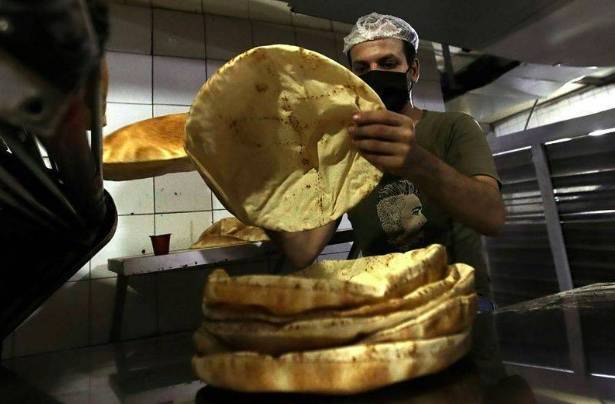
Fresh bread in a Beirut bakery on July 1, 2020. (Credit: AFP)
BEIRUT — Caretaker Economy Minister Amin Salam said on Wednesday in a statement that the $150 million World Bank loan granted to Lebanon to finance wheat imports will be implemented at the end of December. He also indicated that 70 percent of foodstuffs will not be subject to a custom tarrifs increase.
Salam's statement came following a cabinet meeting on Tuesday dedicated to food security, which was held at the Grand Serail and presided over by caretaker Prime Minister Najib Mikati.
Lebanese MPs had on Oct. 18 passed the law instituting a World Bank loan of $150 million to Lebanon to finance wheat imports, to be spent over nine months to help ensure the country's food security.
The loan was offered by the World Bank in early May after the war in Ukraine disrupted global supply chains and halted grain exports leading to wheat shortages in Lebanon.
Salam claimed following today's cabinet meeting that "[wheat] quantities are available in the market following great work by cabinet headed by the Economy Ministry in cooperation with the Interior Ministry, the State Security Agency, Customs and Public Security, all of which enabled bakeries and mills in Lebanon to work in a clear and transparent way, and to find the quantities in the best possible ways."
Lebanon’s mills purchase wheat, mostly from the Black Sea region, and import it into the country for milling into flour, which they deliver onwards to bakeries. Over the summer, the country experienced interruptions in flour deliveries from the mills to the bakeries, which lead to extreme bread shortages and sparked some consumer panics.
Salam indicated, "At the end of this month, the implementation of the World Bank loan, whose effects will begin to appear at the beginning of the year 2023, will start. The import of the first shipments of wheat will take place at the beginning of next January, and thus we will maintain, according to international wheat prices, permanent stability for a year in supporting the bread bundle and wheat prices."
As for the increase in Lebanon's custom duties, Salam stressed that "70 percent of foodstuffs will not subject be to this fee," adding that his ministry is "conducting a careful study of this dossier, and for this reason the regulations were delayed, and we, as a ministry, completely rejected the reflection of all rates increases that amount to either 15 percent, 10 percent or 3 percent on food products, so that the citizen does not bear them."
Finance Minister Youssef Khalil announced to Banque du Liban in November that customs duties would be calculated at a rate of LL15,000 to the US dollar, up from the longstanding official LL1,507.5 rate, as of Dec. 1.
It was anticipated the measure would be accompanied by a massive increase in prices in Lebanese lira.
Salam added that the Economy Ministry "will issue a regulation explaining what products will be subject to customs tax, or a 10 percent tax on imported materials.